- Home
- Nnedi Okorafor
The Book of Phoenix Page 14
The Book of Phoenix Read online
Page 14
“It’s going to be a tight fit,” Saeed said when we got to Mmuo’s car.
I turned to the side, squeezing in. My second time in a car was an even tighter fit than my first time, when I’d gotten into Sarah’s car in Ghana and fled my soon to explode home. My wings were bent in such an excruciatingly awkward position that I hissed with pain. The seats were not made for a Phoenix. But it was the only way to get away from the area without the Big Eye seeing me. I decided this would be the last time I got in a car. It didn’t turn out to be true, but the sentiment certainly was.
CHAPTER 12
Seed
Mmuo’s balcony was wide, facing downtown. The Backbone was in clear view. I wondered if Mmuo had gotten this apartment with me in mind. He’d put a lawn chair out here but I pushed it aside, preferring to sit on the floor. I pulled my knees close to my chest and shut my eyes as the breeze cooled my face. Mmuo’s apartment was on the twenty-first floor, and though the air smelled like exhaust and the mosquitoes still hung around, at least I was high up. These days, I was most comfortable when I was high up. I sighed and relaxed my shoulders and wings as I let it all crash down on me. I was here. With friends. I was alive. I was free.
“Phoenix.”
I wiped the tears from my face as I looked up at Saeed. Then I looked away. He sat down beside me and for a moment we were quiet, looking at the world before us. The apartment was in the city but far enough away from the busiest part to have more trees than tall buildings. A tall palm tree grew so close to the apartment building that I could reach out and touch its top leaves.
“What are you thinking about?” he finally asked.
I looked him square in the eye. “I was thinking about apples,” I said, feeling a sudden flash of anger. My temples ached, and I shut my eyes again. “I was thinking about how they taste.”
Saeed muttered something in Arabic.
“I will learn Arabic one day,” I said. “Just so you can’t do that anymore.”
“I said that you don’t know me,” he said, looking annoyed. “You’re too young to understand a man like me. You’re only three years on this earth.”
“I’ve died,” I said. “Three times. Have you?” I twitched my wings in annoyance.
He looked away and sighed. “Phoenix, you really don’t understand.”
I felt the heat in the middle of my forehead first. Then, in an instant, it had reached the tips of my toes, fingers and wings. Saeed frowned at me but he didn’t move away. Good, I thought. Stay. I hope it burns. A tear fell from my left eye, and I could feel the warm mist brush my eyebrows as the tear slowly evaporated. What if I burn and take this entire building with me? I mused. Saeed, Mmuo, New York. I fought back tears, shocked by the power and violence of my rage. “Why did you try to leave me?” I finally asked. “You saw the bad thing they were doing and then you just decided to subtract yourself as if you were Allah or Zeus? Who are you? What makes you . . .”
“Wake up Phoenix!” he snapped. “Think. What does your mind tell you about what happened? You can read all those books yet you still can’t unravel the truth.” He muttered something in Arabic.
I wanted to shout. I wanted to scream. But those things have never come naturally to me. I was quiet. But my body felt hot. And in the darkness of the evening, there was a glow around my eyesight.
“Calm yourself,” he said, finally moving away. “People will see you.”
I took a deep breath and closed my eyes. Behind my lids I saw a blazing sun slowly set. Then it was just the dark again; I was calm. I heard him move back to me. He took my hand and squeezed it. Then he brought it to his lips and kissed it. His lips were so cool and they felt good.
In my calmness, I realized something. I opened my eyes and looked into his. My heart was beating like crazy. Saeed’s beard was bushy and a rich black. His eyes were clear and dark. He had a strong nose. His face reminded me of the imam in Ghana who’d built the mosque that looked like a sand castle, but Saeed was much younger, and there was nothing Muslim about Saeed.
“Tell me what they did,” I said.
“Ah, so you do have critical thinking skills,” he said quietly.
“Tell me.”
He pulled at his beard and rubbed his face. He nodded. “Ok,” he said. “Ok. Phoenix. Well, remember the lines? The lines on the floor?”
I nodded. Every speciMen deemed tame and trustworthy “walked the line,” a computerized line that would appear on the floor and lead you where you were supposed to go when there was no doctor or guard to lead the way. “Mine was yellow. Yours was red.”
“I hated that line,” he said. “I would have nightmares about it. I had nightmares about a lot of things there.” He pressed his lips tightly together.
“One day, I stepped off the line that was leading me to the lab,” he said. “They were so slow to respond. They were so used to us behaving. Only Mmuo had escaped them and even then, they saw that none of us followed his example. I was halfway across the floor, when they caught up with me. But by then, I’d seen their device, whatever it was. I still had the apple in my hand. I’d planned to paint it. But by then, I was squeezing it as I tried to cope with what I was seeing.
“Before that night, Mmuo and I had been conspiring. We had a plan of escape that was actually quite similar to yours. I cannot read but I’ve listened to many audio books. There is a verse in a poem that has always stuck with me. I didn’t have to even try to memorize it. The poem was so powerful that it stuck to my brain the first time I heard it: ‘Things fall apart, the center cannot hold,’ by a man named Yeats.
“The towers have changed life. Not just in the States but all over the world, I suspect. You know this more than me, but I sense it. All the cures, inventions and enhancements have changed so much. But the core of the tower’s philosophy has always been rotten. And in due time, it will collapse on itself and everything will go down. Mmuo knew this, and I knew this. We were planning escape because we didn’t want to be there when it happened, and we wanted to make it happen, if that makes sense.
“I was dying inside, Phoenix. They brought me here after living on the streets of Cairo. I had no family, just survival, primal powerful survival. Yet after only a few years in Tower 7, I was dying inside. They did things to me, they changed me, and I watched them do worse things to others. I’d come into that dining hall and see the changes with my own eyes. Then I met you, and I watched them do things to you.
“You came to me that first day. I had never seen anything like you. You do not know what you look like to others, Phoenix. No words can describe it. Yet, I knew you were doomed. There were female Big Eye who wanted me as their plaything but saw how much I felt for you, and they would tell me things, raw painful facts. They wanted to draw me away from you. The Big Eye women are cruel in ways you would not want to know. But the fact is, I knew what you were, Phoenix. Destined to burn. A weapon.
“Then I met Mmuo and once we got to know each other, he saw in me a partner in crime. I saw in him someone who had escaped. We fed off each other. He visited me often, but not too often. The Big Eye knew it but did not worry. Our time was close but not yet.”
My eyes stung. How come he had never spoken of all this with me?
“Never,” he continued. “I would never have left you. I was waiting for the right time. Ask Mmuo.” He paused. “But seeing that device, all that death, death from I don’t know when, I forgot all that. Phoenix, it showed a time and place where mounds and mounds of Africans were dead! What were they doing? When was . . . ?”
“I didn’t see Africans,” I said, frowning. “I saw Caucasians.”
He stared at me for a long moment, then shrugged. “Genocide is genocide. Maybe you saw them looking through a different time and place.”
I nodded, wanting him to continue.
“When I saw that machine, I went mad,” he said. “I don’t remember much other
than red. Red lines, many of them, clouding my vision. I still had the apple in my hand that I’d taken from you. That was red, too.” A blank look crossed Saeed’s face. “I burst into that room and threw it at the Big Eye. I threw a scanner and anything else I could get my hands on to destroy that black machine. I don’t remember if I caused any momentary break in transmission. I was just picking things up and throwing them. It took ten Big Eye to restrain me. They dragged me back to my room and beat the hell out of me. All through, I kept thinking about you. You didn’t know anything and there was always so much hope in your eyes. I kept thinking about what would happen to that hope if I told you about what I’d seen or if I never returned to you.” He paused, frowning at me. “But now I see something new in your eyes. Now, when I look into them it’s like looking into a mirror. Your innocence is gone.”
“Death will do that,” I wanted to say. But I did not.
“They left me for a few hours,” he continued. “I floated in and out of consciousness. Then they must have decided that I was damaged goods because later that night, they burst into my room and injected me with something that was supposed to kill me but didn’t. That’s how I woke up in the morgue in the US Virgin Islands in Tower 4. There was a tag on my finger that said ‘Dismember. Organs will self-preserve. Use for transplant’. I was more valuable to them dead than alive.”
I waited for him to go on and tell me exactly what happened then but he said nothing. I was glad. I’d gone digging for answers and pulled up something naked, ugly, and upsetting. However, by the next day, I was still simmering.
“There is no ‘long time ago’ for me,” I snapped. Saeed and I were sitting in Mmuo’s car while Mmuo was inside, buying groceries. Saeed had been telling me about his other life, when he was “a homeless kid in Egypt,” and I just didn’t want to hear any more.
I had no real reason to be irritated, but I was. I didn’t want to hear his tale of torture, survival, and misery. I didn’t want to hear about how his father had indentured him at the age of six to a successful but physically and verbally abusive pharmacist who wanted a child slave, not an apprentice. I didn’t want to hear how his mother never spoke a word of protest as she watched the pharmacist drive away with him. I didn’t want to hear about how Saeed ran away at the age of seven from the pharmacist the night the man beat him unconscious because his paranoid over-medicated wife didn’t like the “conniving” way Saeed had looked at her. I didn’t want to hear about how he lived for three years on a digital dumpsite making money by burning old computer parts and selling the exposed copper wiring.
Saeed stopped talking. He smiled. “People like you have always been.”
I frowned. I didn’t understand what he meant. I didn’t want to understand anything. Or anyone. I just wanted to be free of all the weight, free of my constant anger, free of being a fugitive, of Saeed’s awful recent and distant past, of all our murky futures. At least for a little while.
However, I had to stay in the car. It was the closest to being in public that Mmuo felt I should be. After seeing the in-depth news stories that marked me as a dangerous, murderous speciMen that authorities were “close to securing,” I agreed with him. They gave me no name, but the lesser viewed stories showed images of my face from when I’d “brought down The Axis” building, and none of them referred to me with a pronoun other than “it.” Saeed insisted that the Big Eye were making sure every journalist “coordinated” in the image presented of me. A woman was not dangerous, so no need to panic. An African was a threat, so do not hesitate to kill her. A winged human being was an abomination, not angelic; so when it’s over, forget her death quickly.
Still, my days in Ghana had taught me that I was no longer a creature who could be comfortable being indoors for long periods of time. I never knew whether this was because I was a winged creature now or because of some sort of fallout from my days in Tower 7. I banged my fist against the car door. A beeping sound came from the front seat and my door opened. The car thought I wanted to get out. It really was a “smart car.”
Saeed reached over the seat, leaned across me and shut the door. He looked into my eyes. I instinctively leaned back.
“They’re looking for you, Phoenix.”
I scoffed. “They are looking for a non-human nonentity.”
“No, they are looking for you,” he said.
“They won’t find me,” I said, looking away.
“Maybe, but you’ll have to run,” he said. “Wherever you expose yourself, you’ll have to flee from there.” He paused. “And we can’t follow you, either.”
Everything in me clenched and the pain of it surprised me. My wings pushed my burka away and slapped the car ceiling. I gasped, regaining control. Saeed looked around as he quickly pulled my burka back over my wings. Tears squeezed from my eyes as I took a calming breath.
“Relax, Phoenix,” Saeed whispered. “Relax.”
I grimaced and sniveled, rubbing my temples. The pain.
He climbed over the seat and sat beside me cradling me with his arms. I leaned against him, shutting my eyes. I never saw darkness. Just red. Especially in the sunshine. I lifted a hand and slowly ran the back of it over Saeed’s short beard. The roughness felt good against my skin. I turned my hand and stroked it with my fingertips.
“I’ve mourned you,” I said. “I wept, beat myself up, cursed, bled for you. Then I healed. I buried you here.” I put my hand over my heart. “And now . . .”
“I’m sorry,” he said. “I couldn’t . . .”
“I loved a man named Kofi Annan,” I said, shutting my eyes again. I could see Kofi clearly. I remembered him over two lifetimes. He was dark-skinned like me and beautiful like the few African men allowed to star in 3D movies. But he was also humble and unaware of his beauty because he had so many more important things to focus on. He had a head full of rough black hair, and he stood an inch shorter than me. “The Big Eye took his family away years ago. And then they killed him years later because he tried to protect me. He died because of me.”
“Mmuo told me, Phoenix,” he said, looking at his hands. “I know everything. You don’t have to tell me, again.”
“I lost you. I lost him,” my voice shook, and I wished I hadn’t started talking. It was like scratching at a fresh scab. “I . . . I can’t lose . . .”
“We have nothing to lose,” he said, taking my face into his warm hands.
He kissed me.
I saw Tower 7. The dining hall. We sat close to each other and he’d kissed me. It was fast. His lips were cool, and we’d looked at each other afterwards, first with surprise, then delight, then we’d veiled our faces with secrecy. SpeciMen were not allowed to pair unless the Big Eye deemed it good research.
Now, this kiss was not like the ones we shared in Tower 7. There was heat and humidity. I was able to wrap my arms around him and him around me. I was able to feel him. Saeed may have been lean, but he was strong. And unlike in Tower 7, this kiss lasted. Saeed could not eat fruit yet his mouth tasted like mangos. He pulled back from me, a surprised look on his face. Then his face broke out in a smile, hunger in his eyes. “Warm,” he breathed. “You’re always so warm.”
I felt heated but it was not the type of heat I had come to know too well. This was something new and exquisite. My entire body felt like it was humming. My wings wanted to stretch and fly. I needed to get outside. I wanted Saeed to take me outside.
A knock on the window made us both jump. We scrambled away from each other. The doors unlocked and Mmuo opened the door on the passenger side. He peeked in and chuckled, shaking his head. Then he placed two grocery bags on the seat. He walked to the trunk and opened it and started loading in the rest of the groceries. Saeed opened his door and leaned out. “You need any help with those?” he asked.
Mmuo held up a hand, still laughing. “I think it best if you don’t get up.”
Saeed glanced at his lap an
d then looked at me. I turned and looked out the window, embarrassed. It wasn’t because Mmuo had caught Saeed and I being intimate. Mmuo was my family; he did not wish me ill. He would protect me, and I would protect him. What issue would he have with my closeness with Saeed? It was certainly nothing surprising or new. He’d known about us in Tower 7.
No. What I was embarrassed about was something more basic. Saeed was twenty-one years old and had lived a rough life both in Egypt and then in Tower 7. He’d told me that he’d been intimate with several of the Big Eye female guards over the years. This was why when I came along, they had hated me and told him ugly details about me and what I was.
But despite the fact that I looked and felt 40 years old, I was only three. I was still processing the intense feeling that had swept through my body. I’d felt whispers of it minutes before Kofi died, when I’d shown him myself and he’d touched my wings. I shivered. There was a sweet aching between my legs and at the tips of my wings. As Mmuo started the car, Saeed took my hand, wove his fingers between mine and grasped.
I looked at my hands grasping Saeed’s and realized something else. I wanted to laugh out loud with relief. Instead I sat back and looked out the window. We passed office buildings and one had a large urban garden, full of sunflowers, tomato plants and possibly dasheen bushes.
I wasn’t glowing. Praise Ani, I wasn’t glowing. I was warm, not hot, and I wasn’t glowing. This was good for Saeed and good for me. It was good for everyone.
CHAPTER 13
Terrorists
I love books. I adore everything about them. I love the feel of the pages on my fingertips. They are light enough to carry, yet so heavy with worlds and ideas. I love the sound of the pages flicking against my fingers. Print against fingerprints. Books make people quiet, yet they are so loud. I love the smell of the pages, even of the newest physical books, which were so rarely made. These new books had stiff grey pages made from doubly recycled paper and were printed with vegetable ink that was 100 percent biodegradable and smelled strongly of spoiled broccoli. I loved them as I loved the 300-year-old books that threatened to crumble in my hands.

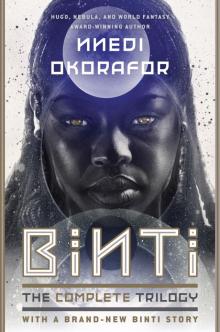 Binti, The Complete Trilogy: Binti ; Home ; The Night Masquerade
Binti, The Complete Trilogy: Binti ; Home ; The Night Masquerade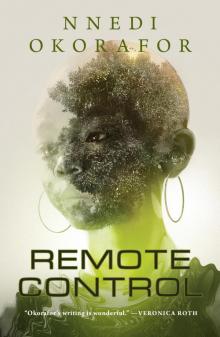 Remote Control
Remote Control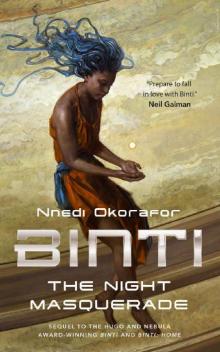 Binti: The Night Masquerade
Binti: The Night Masquerade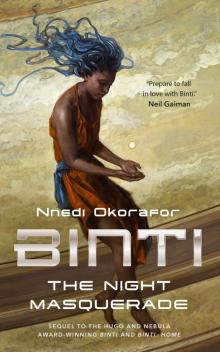 Binti--The Night Masquerade
Binti--The Night Masquerade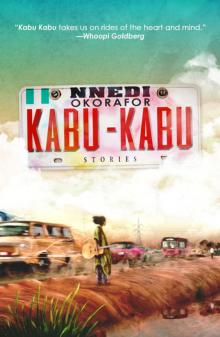 Kabu Kabu
Kabu Kabu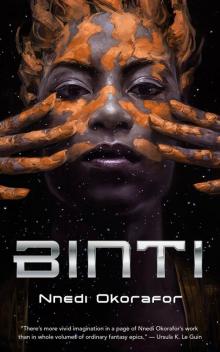 Binti
Binti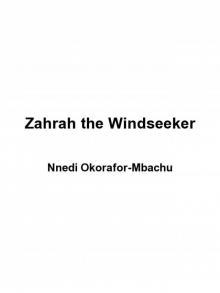 Zahrah the Windseeker
Zahrah the Windseeker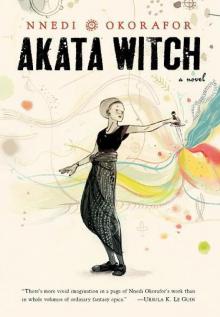 Akata Witch: A Novel
Akata Witch: A Novel Ikenga
Ikenga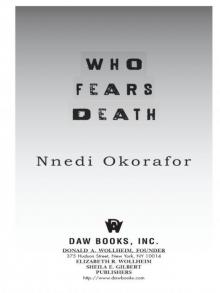 Who Fears Death
Who Fears Death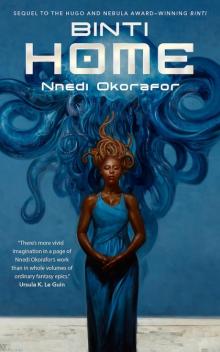 Binti--Home
Binti--Home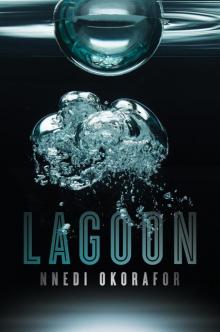 Lagoon
Lagoon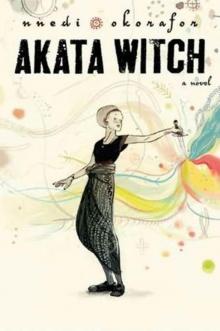 Akata Witch
Akata Witch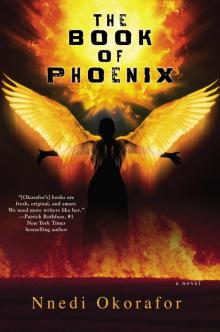 The Book of Phoenix
The Book of Phoenix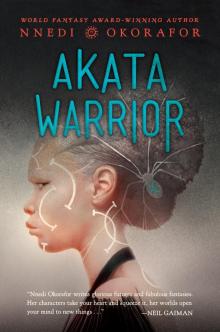 Akata Warrior
Akata Warrior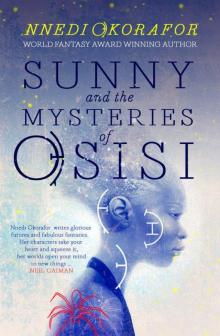 Sunny and the Mysteries of Osisi
Sunny and the Mysteries of Osisi